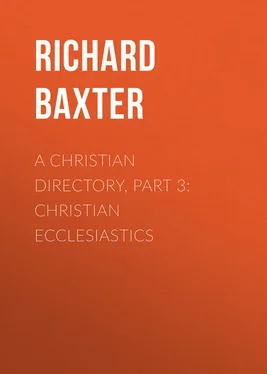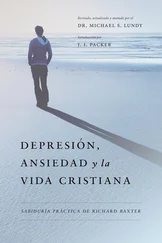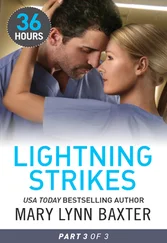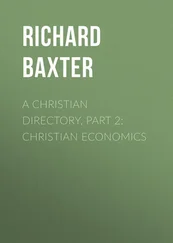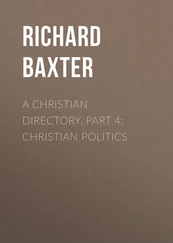Richard Baxter - A Christian Directory, Part 3 - Christian Ecclesiastics
Здесь есть возможность читать онлайн «Richard Baxter - A Christian Directory, Part 3 - Christian Ecclesiastics» — ознакомительный отрывок электронной книги совершенно бесплатно, а после прочтения отрывка купить полную версию. В некоторых случаях можно слушать аудио, скачать через торрент в формате fb2 и присутствует краткое содержание. Жанр: foreign_antique, foreign_prose, на английском языке. Описание произведения, (предисловие) а так же отзывы посетителей доступны на портале библиотеки ЛибКат.
- Название:A Christian Directory, Part 3: Christian Ecclesiastics
- Автор:
- Жанр:
- Год:неизвестен
- ISBN:нет данных
- Рейтинг книги:3 / 5. Голосов: 1
-
Избранное:Добавить в избранное
- Отзывы:
-
Ваша оценка:
- 60
- 1
- 2
- 3
- 4
- 5
A Christian Directory, Part 3: Christian Ecclesiastics: краткое содержание, описание и аннотация
Предлагаем к чтению аннотацию, описание, краткое содержание или предисловие (зависит от того, что написал сам автор книги «A Christian Directory, Part 3: Christian Ecclesiastics»). Если вы не нашли необходимую информацию о книге — напишите в комментариях, мы постараемся отыскать её.
A Christian Directory, Part 3: Christian Ecclesiastics — читать онлайн ознакомительный отрывок
Ниже представлен текст книги, разбитый по страницам. Система сохранения места последней прочитанной страницы, позволяет с удобством читать онлайн бесплатно книгу «A Christian Directory, Part 3: Christian Ecclesiastics», без необходимости каждый раз заново искать на чём Вы остановились. Поставьте закладку, и сможете в любой момент перейти на страницу, на которой закончили чтение.
Интервал:
Закладка:
Rule III. No vows or promises of our own can dissolve the obligation laid upon us by the law of God. For we have no co-ordinate, much less superior authority over ourselves; our self-obligations are but for the furthering of our obedience.
Rule IV. Therefore no vows can disoblige a man from any present duty, nor justify him in the committing of any sin. Vows are to engage us to God, and not against him: if the matter which we vow be evil, it is a sin to vow it, and a sin to do it upon pretence of a vow. Sin is no acceptable sacrifice to God.
Rule V. If I vow that I will do some duty better, I am not thereby disobliged from doing it at all, when I am disabled from doing it better. 66 66 How often perjury hath ruined christian princes and states all history doth testify. The ruin of the Roman empire by the Goths, was by this means. Alaricus having leave to live quietly in France, Stilico comes in perniciem Reipub. Gothos pertentans, dum eos insidiis aggredi cuperet, belli summam Saulo pagano duci commisit: qui ipso sacratissimo die Paschæ, Gothis nil tale suspicantibus, super eos irruit, magnamque eorum partem prostravit. Nam primum perturbati Gothi, ac propter religionem cedentes, demum arma corripiunt, victoremque virtute potiori prosternunt exercitum: hinc in rabiem furoris excitantur. Cœptum iter deferentes, Romam contendunt petere, cuncta igne ferroque vastantes: nec mora; venientes urbem capiunt, devastant, incendunt, &c. Paul. Diaconus, lib. 3.
Suppose a magistrate, seeing much amiss in church and commonwealth, doth vow a reformation, and vow against the abuses which he findeth; if now the people's obstinacy and rebellion disable him to perform that vow, it doth not follow that he must lay down his sceptre, and cease to govern them at all, because he cannot do it as he ought, if he were free. So if the pastors of any church do vow the reformation of church abuses, in their places, if they be hindered by their rulers, or by the people, it doth not follow that they must lay down their callings, and not worship God publicly at all, because they cannot do it as they would, and ought if they were free; as long as they may worship him without committing any sin. God's first obligation on me is to worship him, and the second for the manner, to do it as near his order as I can: now if I cannot avoid the imperfections of worship, though I vowed it, I must not therefore avoid the worship itself (as long as corruptions destroy not the very nature of it, and I am put myself upon no actual sin). For I was bound to worship God before my vows, and in order of nature before my obligation de modo : and my vow was made with an implied condition, that the thing were possible and lawful: and when that ceaseth to be possible or lawful which I vowed, I must, nevertheless, do that which still remaineth possible and lawful. To give over God's solemn worship with the church, is no reformation. To prefer no worship before imperfect worship, is a greater deformation and corruption, than to prefer imperfect worship before that which is more perfect. And to prefer a worship imperfect in the manner, before no church worship at all, is a greater reformation than to prefer a more perfect manner of worship before a more imperfect and defective. To worship God decently and in order, supposeth that he must be worshipped; and he that doth not worship at all, doth not worship him decently. If a physician vow that he will administer a certain effectual antidote to all his patients that have the plague, and that he will not administer a certain less effectual preparation, which some apothecaries, through covetousness or carelessness, had brought into common use, to the injury of the sick; his vow is to be interpreted with these exceptions: I will do it if I can, without dishonesty or a greater mischief: I will not administer the sophisticated antidote when I can have better: I vow this for my patients' benefit, and not for their destruction. Therefore if the sophisticated antidote is much better than none, and may save men's lives, and the patients grow wilful and will take no other, or authority forbid the use of any other, the physician is neither bound to forsake his calling rather than use it, nor to neglect the life of his patients (if their lives indeed lie upon his care, and they may not be in some good hopes without him, and the good of many require him not to neglect a few). But he must do what he can, when he cannot do what he would, and only show that he consenteth not to the sophistication.
Rule VI. Though he that voweth a lawful thing, must be understood to mean, if it continue possible and lawful; yet if he himself be the culpable cause that afterwards it becometh impossible or unlawful, he violateth his vow. He that voweth to give so much to the poor, and after prodigally wasteth it, and hath it not to give, doth break his vow; which he doth not if fire or thieves deprive him of it against his will. He that voweth to preach the gospel, if he cut out his own tongue, or culpably procure another to imprison, silence, or hinder him, doth break his vow; which he did not if the hinderance were involuntary and insuperable: consent doth make the impedition his own act.
Rule VII. In the taking and keeping of oaths and vows we must deal simply and openly without equivocation and deceit. 67 67 Sanders. p. 30, 31.
Psal. xxiv. 3-5, "Who shall ascend into the hill of the Lord? or who shall stand in his holy place? He that hath clean hands, and a pure heart; who hath not lifted up his soul unto vanity, nor sworn deceitfully. He shall receive the blessing from the Lord, and righteousness from the God of his salvation."
Rule VIII. He that juggleth or stretcheth his conscience by fraudulent shifts and interpretations afterwards, is as bad as he that dissembleth in the taking of the oath. To break it by deceit, is as bad as to take it in deceit. Psal. xv. 1, 4, "Lord, who shall abide in thy tabernacle – he that sweareth to his own hurt and changeth not." Saith Dr. Sanderson, 68 68 Sanders. p. 32-41.
Ista mihi aut non cogitare , &c. "It seemeth to me that the greater part of the men of these times either think not of these things, or at least not seriously; who fear not, at large and in express words, without going about, to swear to all that, whatever it be, which is proposed to them by those that have power to hurt them: yea, and they take themselves for the only wise men, and not without some disdain deride the simplicity and needless fear of those, that lest they hurt their consciences forsooth, do seek a knot in a rush, and oppose the forms prescribed by those that have power to prescribe them. And in the mean time they securely free themselves from all crime and fear of perjury, and think they have looked well to themselves and their consciences, if either when they swear, like Jesuits, they can defend themselves by the help of some tacit equivocation, or mental reservation, or subtle interpretation which is strained and utterly alien from the words; or else after they have sworn can find some thing to slip through, some cunning evasion, as a wise remedy, by which they may so elude their oath, as that keeping the words, the sense may by some sophism be eluded, and all the force of it utterly enervated. The ancient christians knew not this divinity, nor the sounder heathens this moral philosophy. For otherwise saith Augustine, They are perjured, who keeping the words, deceive the expectation of those they swear to: and otherwise saith Cicero," &c. He goeth on to confirm it at large by argument.
Rule IX. An oath is to be taken and interpreted strictly. Sanderson saith, 69 69 Sanders. p. 41-44. Ubi de justo sensu ambigitur, longe satius est et naturæ rei accommodatius, strictiore quam benigniore uti interpretatione. ibid. p. 44.
Juramenti obligatio est stricti juris ; that is, non ut excludat juris interpretationem æquitate temperatam; sed ut excludat juris interpretationem gratia corruptam : "not as excluding an equitable interpretation, but as excluding an interpretation corrupted by partiality: " that it be a just interpretation, between the extremes of rigid, and favourable or partial; and in doubtful cases it is safer to follow the strict, than the benign or favourable sense. It is dangerous stretching and venturing too far in matters of so sacred a nature, and of such great importance as vows and oaths.
Интервал:
Закладка:
Похожие книги на «A Christian Directory, Part 3: Christian Ecclesiastics»
Представляем Вашему вниманию похожие книги на «A Christian Directory, Part 3: Christian Ecclesiastics» списком для выбора. Мы отобрали схожую по названию и смыслу литературу в надежде предоставить читателям больше вариантов отыскать новые, интересные, ещё непрочитанные произведения.
Обсуждение, отзывы о книге «A Christian Directory, Part 3: Christian Ecclesiastics» и просто собственные мнения читателей. Оставьте ваши комментарии, напишите, что Вы думаете о произведении, его смысле или главных героях. Укажите что конкретно понравилось, а что нет, и почему Вы так считаете.
